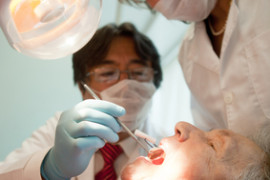We all know the perils of a high-fat diet. It puts us at risk for heart disease, obesity, diabetes, and other short- and long-term health complications.
Researchers in Japan have recently uncovered evidence that persistent P. gingivalis infection is just as bad at disrupting the gut microbiome and causing systemic inflammation as a high-fat diet.
P. gingivalis is one of the most common, most virulent pathogens that causes periodontal disease, but the damage it inflicts does not stop in the mouth. It is able to travel throughout the body, disrupting the immune system and inflicting damage on tissues and organ systems.
After noticing that mice repeatedly infected with P. gingivalis experienced a significant change in their gut microbiota—which ultimately led to systemic inflammation and insulin resistance—the researchers wondered whether this same effect might happen to mice that had only been given one administration of P. gingivalis.
In the study, P. gingivalis significantly altered the proportions of bacteria in the gut microbiome and down-regulated the expression of tight junction proteins and occludin, which are involved in intestinal permeability. They also found bacterial DNA in the liver. These changes in the gut micribiota preceded systemic inflammatory changes by 24 hours. They concluded that this disturbance may be a causal mechanism linking periodontitis and systemic disease.
“However, repeated administration of P. gingivalis induces inflammatory changes in the adipose tissue and liver, as well as glucose intolerance, which notably are characteristics of mice on a high-fat diet. Therefore, it is conceivable that oral administration of P. gingivalis has a similar effect to consuming a high-fat diet, since both induce changes in gut microbial composition and subsequent increased intestinal permeability. This notion is further supported by the similarity in the gene expression profiles of adipose tissues from high-fat diet-fed and P. gingivalis-administered mice.”
You read that right: P. gingivalis appears to be as bad for you as a high-fat diet.
Many of us try to take steps in order to be healthier. We stay away from foods high in saturated fats. We eat more vegetables. We exercise. We meditate. But many of us—nearly 80% of the adult population, in fact—are walking around with a persistent infection that might be just as bad as hitting the drive-thru every day at lunchtime.
Oral health belongs next to diet and nutrition, physical activity, stress management and tobacco cessation, and sleep as a pillar of wellness because, like these essential aspects of health, it plays a large part in the prevention and management of inflammatory disease.



